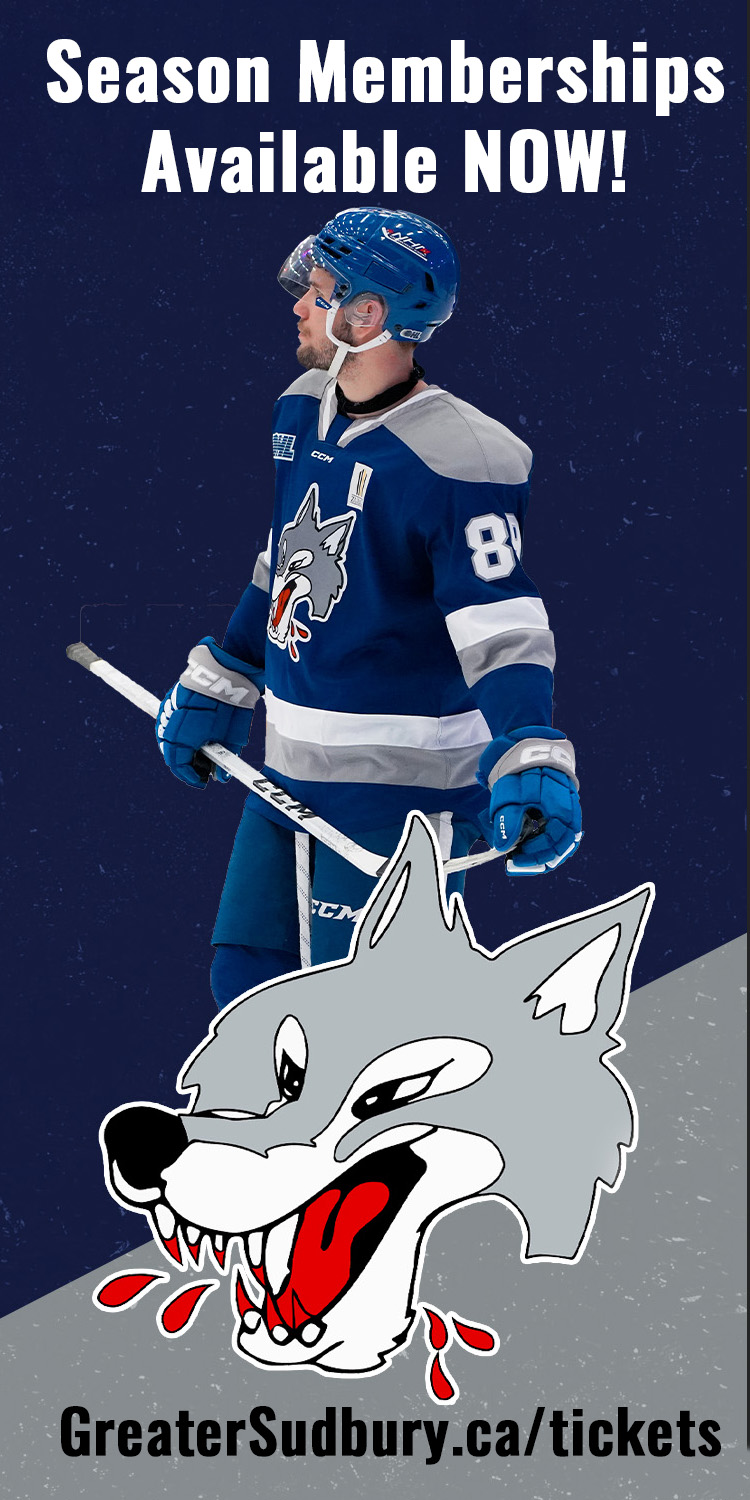In the 48 years that the Sudbury Wolves have represented this area in the Ontario Hockey League (God only knows if the 2020-2021 campaign will be included in the count towards fifty or not), four times has the club seen one of its own recognized as the top defenceman in the loop: Jeff Brown (1985-1986 - co-winner with Terry Carkner), Jamie Rivers (1993-1994), Alexei Semenov (2001-2002) and Marc Staal (2006-2007).
That’s twice as many times as Sudbury and the outlying regions have witnessed a local product walk off with the >Max Kaminsky Trophy - ironically, with those honours bestowed upon blueliners of the Ottawa 67’s, on both occasions.
The current second generation of junior fans might recall the very memorable 1996-1997 season produced by Sean Blanchard, who went on to capture the CHL hardware as well, moving on to a lengthy pro career that would see him make stops in no less than twenty different outposts ranging from Estero (Florida) to Frankfurt (Germany).
But one has to go much further into the memory banks to recall the beauty of a blueliner that was Randy Boyd.
The 5’11” all-around d-man would follow-up his selection in the third round of the 1980 NHL draft by the Pittsburgh Penguins, selected as the top player, at his position, in the OHL the following year. An ultra proud Coniston native, Boyd would finish with more than 250 NHL games to his credit.
If life on the road (Boyd would suit up with four different NHL teams and another quartet of AHL/IHL/CHL venues - not to mention two years in Austria) was challenging, the now 59 year-old resident of Atlanta could lay claim to dealing with hardships long before, directly on the home front.
Boyd was nine, one of six children in the family, when his father passed away. “My mother (Katherine - “Kool Kat” as he suggests she was known) raised six of us by herself, which was an amazing feat in itself,” said Boyd. “My family never owned a car until I bought one when I turned pro.”
“I bought a brand new Camaro, drove it for one summer and then gave it to my mother - so then she had to go out and get her license,” he stated.
For a handful of very good reasons, the community of Coniston played a prominent role in the formative years of a young, developing Randy Boyd. “In my early years, I had the greatest inspiration and guy to look up to in (fellow Coniston star) Jimmy Fox,” he said. “I was in awe of him. He was unreal, and not just at hockey - he was an all-around unbelievable athlete.”
As luck would have it, Fox and Boyd travelled parallel hockey pathways.
Fox would leave home at 15, competing for the North Bay Trappers junior team, before being drafted by the 67’s. Boyd would do the same at the age of sixteen. “In my rookie year in Ottawa, not only do I get to play one year with Jimmy, but also with another kid from my hometown - Chris Veno.”
“Think about that - three kids from a town of 3000, all playing on the same junior team.”
The Jimmy Fox captained team would win 45 games in 1979-1980. Boyd would assume the captaincy the next year, helping match that victory total and playing the first half of the 1981-1982 schedule before earning a call-up from the Penguins.
“I loved Ottawa,” said Boyd. “We had great teams, even if we didn’t get as far in the playoffs as we had hoped, or maybe we should have - but that happens.”
With the legendary Brian Kilrea behind the bench, Boyd would prosper, acknowledging that not every single player could connect with the coach in exactly the same way that Fox, Boyd and hundreds of others have done.
“There was no one like Killer,” said Boyd. “How he went about his business, I can guarantee that nobody did it like that - and I’ll just leave it at that. He challenged you, and you either jumped at the chance and relished at those challenges and you succeeded, or you didn’t.”
At just 19 years of age, Boyd would play 23 games (plus another three in the playoffs) on a Pittsburgh team that featured the likes of Randy Carlyle, Rick Kehoe and Pat Boutette. The local product looked to have the hockey world in his hands.
Yet over the course of the next eight years, Boyd would exceed the 50 NHL game plateau on only three occasions, despite consistently posting absolutely gaudy numbers in the minors and capturing the Governors’ Trophy as the top defenceman in the IHL in 1988-1989, excelling with the Milwaukee Admirals.
Years later, Boyd strikes a balance, putting his career into perspective, understandably proud of all that he accomplished, yet left with the nagging questions that stemmed from a hockey environment in which open communication with the players was seldom emphasized or encouraged.
“I came out of juniors as a very physical hard-nosed two way defenceman with some offensive skills,” he said. “I could play the PK, block shots, fight if I had to. I got to the NHL and thought that was what my role was supposed to be.”
And at times, it was - just not nearly as often as Boyd would have liked.
“At this point, I am well past the regrets with hockey,” he conceded. “But there were tough times, trying to understand. When I was given opportunities, I usually delivered - but my opportunities were not consistent.”
In fact, his best overall stretch in the pros may well have come between 1985 and 1987, a period which featured stints with both the New York Islanders (85 games) and the Springfield Indians (48 games). “When I had my best shot with the Islanders, my most consistent playing time, it was because guys were hurt,” acknowledged Boyd.
“That was satisfying, to know that you’re coming to the rink, that you’re going to play and that you can contribute. It doesn’t matter what level of hockey you are playing, there’s a big difference coming to the rink and knowing you are playing.”
Still, trying to read the tea leaves when it came to management level decisions was both next to impossible and extremely frustrating for Boyd - which, quite honestly, only made him exactly like so many other aspiring NHLers of that era. “The whole approach today is so different than it was in the dog days of the seventies and eighties,” he said.
“They were so shortsighted on so many things - but that’s just my opinion. When I was with the Islanders, I would get sent down to the minors, but when I got called up, I was on the first power play. It was a very confusing time.”
Ultimately, it would lead Boyd to accept an offer to spend a couple of winters in Vienna (1989-1991). “I was definitely hesitant to do it, but looking back, I know it was the right thing to do,” he said. “Just the history of those European cities, travelling around there - what a great situation that was.”
Thankfully, it came right on the heels of perhaps his favourite year of pro hockey, a memorable campaign in Milwaukee that would see the Admirals advance to the semi-finals of the Turner Cup. “We had great support, a great team,” said Boyd. “I had a great coach in Rick Ley, who just let me play. It was just fun playing hockey.”
Those are the memories that Boyd now clings to. Having spent a quarter of a century in Georgia, during much of which the northern Ontario gent would volunteer to coach within the Atlanta Fire youth hockey organization, Randy Boyd is at peace with his legacy in the sport.
“You start to put it in perspective and think of how many kids dreamed of playing in the pros, how many kids really wanted to be there,” he said. “It was maybe not the career I had in mind when I turned pro, but there were still lots of great things along the way.”








